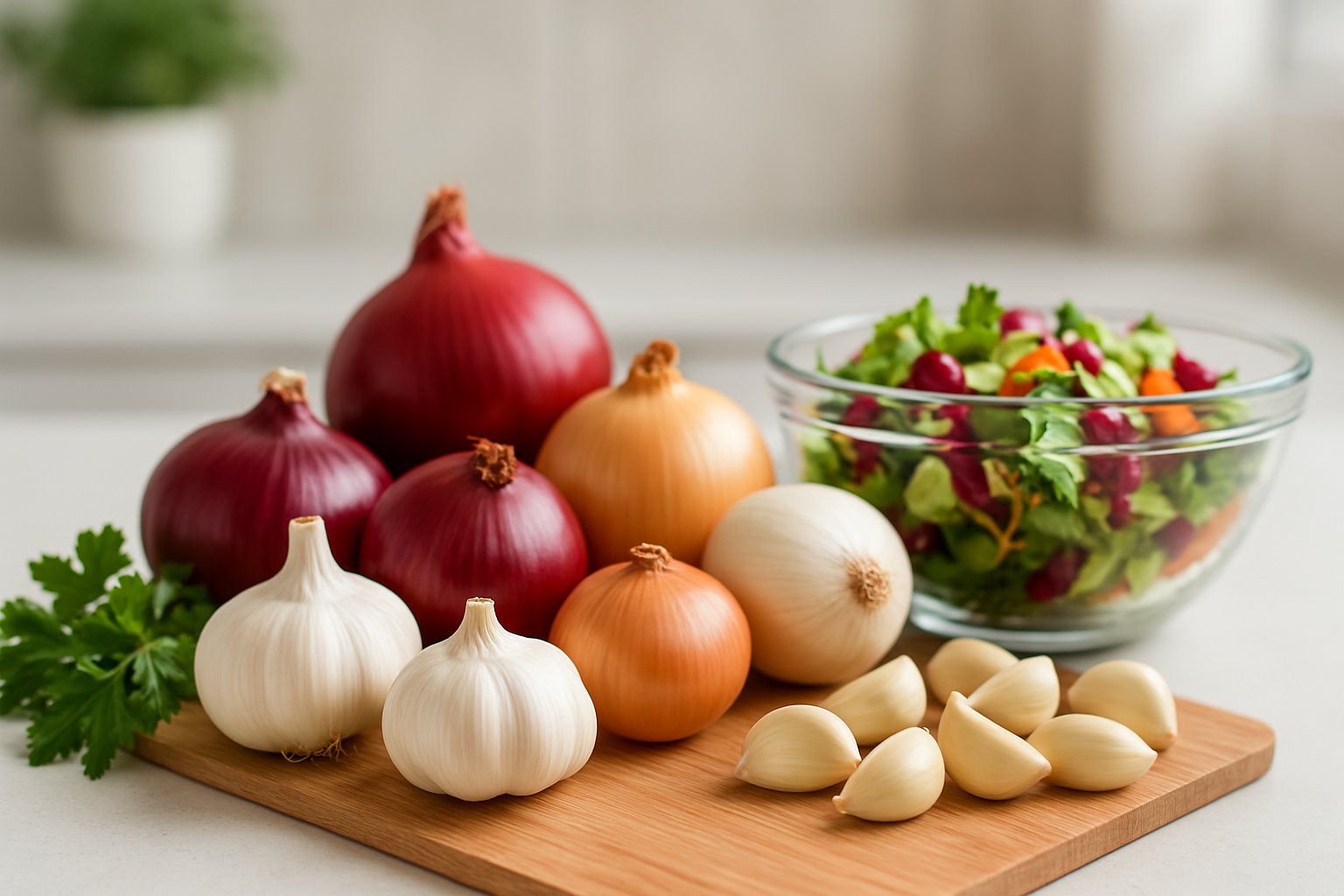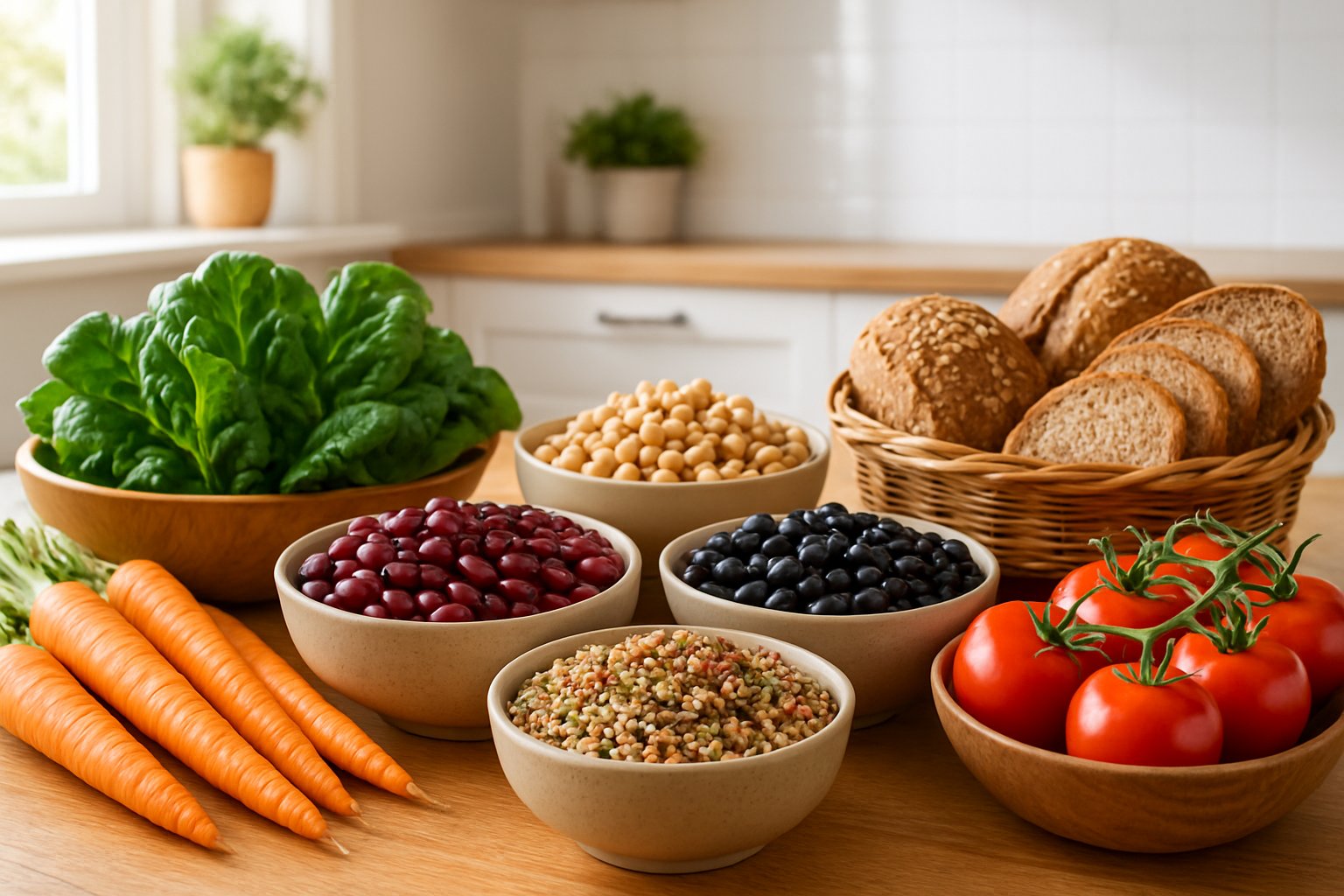Good digestion plays a key role in overall health and daily comfort. Many people experience bloating, gas, or stomach discomfort without realizing that simple changes can make a big difference. Poor digestion can affect energy levels, mood, and how the body absorbs important nutrients from food.

Simple lifestyle adjustments can provide immediate relief from digestive issues and improve how the body processes food. Natural ways such as dietary changes, stress management, water intake, and an active lifestyle can be helpful to improve digestion[1]. These methods work quickly and don’t require expensive supplements or major diet overhauls. Most people can start feeling better within days by making small but effective changes to their daily habits.
1. Increase water intake to aid digestion

Water plays a key role in healthy digestion. The body needs enough water to break down food and move it through the digestive system.
When someone drinks too little water, they may experience bloating and constipation. Water helps move food through the intestinal tract[2]. Without enough water, digestive matter becomes too dry and hard to move properly.
Proper hydration keeps the digestive process flowing smoothly. Water helps dissolve nutrients so the body can absorb them better. It also softens stool, making bowel movements easier.
Most adults should drink about 8 glasses of water per day. People can increase their water intake by keeping a water bottle nearby. They can also eat water-rich foods like cucumbers and watermelon.
Drinking water throughout the day works better than drinking large amounts at once. Sipping water regularly helps maintain steady hydration levels. This steady approach supports consistent digestive function.
People who increase their water intake often notice less bloating within a few days. They may also have more regular bowel movements. These improvements happen because water helps the digestive system work as it should.
2. Eat probiotic foods like yogurt and kimchi

Probiotic foods contain live bacteria that help keep the gut healthy. These good bacteria support digestion and can improve how food moves through the body.
Yogurt, sauerkraut, kimchi and kombucha can improve overall gut health[3] and offer other benefits. Each of these foods contains different types of helpful bacteria.
Yogurt is one of the most common probiotic foods. It contains live cultures that can help balance the digestive system.
Kimchi and sauerkraut are fermented vegetables. They provide probiotics along with fiber that feeds good bacteria in the gut.
Some foods like kimchi, sauerkraut, kombucha, and natto can contain equal or even greater probiotic counts than yogurt[4]. This makes them powerful options for digestive health.
Kombucha is a fermented tea drink. It offers probiotics in liquid form and can be easier to digest for some people.
Eating probiotic-rich foods helps balance the microbiome[5] and benefits the whole body. Adding these foods to daily meals can start improving digestion right away.
3. Include prebiotic foods such as garlic and onions

Prebiotic foods feed the good bacteria in your gut. This helps create a healthy balance in your digestive system.
Garlic and onions are rich in prebiotic compounds[6] called fructans. These substances travel to your large intestine where beneficial bacteria use them as food.
Foods high in fructans include onions, leeks, shallots, and garlic[7]. Adding these to meals provides direct support for digestive health.
Other prebiotic options include asparagus, Jerusalem artichokes, and oats. Bananas also contain prebiotic fibers that support gut bacteria.
These foods enhance digestion and boost immunity[6] by creating the right environment for healthy bacteria to grow. They can also reduce inflammation in the digestive tract.
People can start by adding raw or cooked garlic and onions to their regular meals. Even small amounts provide prebiotic benefits for gut health.
4. Manage stress through meditation or deep breathing

Stress directly impacts digestion by disrupting normal stomach and intestinal functions. When someone feels stressed, their body shifts energy away from digestive processes.
Deep breathing exercises can improve digestive health[8] by activating the body’s relaxation response. This helps the digestive system work more effectively.
Meditation reduces cortisol levels in the body. High cortisol interferes with proper digestion and can cause stomach problems.
Simple breathing techniques work quickly. A person can take five deep breaths through their nose and exhale slowly through their mouth.
Intentional breathing can reduce cortisol and lower blood pressure[9]. These changes help the digestive system function better.
Regular meditation practice trains the body to stay calm. Even ten minutes daily can make a difference in how well someone digests food.
Abdominal breathing works especially well for digestion. The person places one hand on their chest and one on their belly, then breathes so only the bottom hand moves.
These stress management techniques help the body focus on breaking down food properly instead of dealing with stress hormones.
5. Take a short walk after meals

A gentle walk after eating can boost digestion naturally. Light movement helps food move through the digestive system more efficiently.
Walking after eating promotes better digestion[10] by stimulating the muscles in the stomach and intestines. This gentle activity encourages the body to process food more effectively.
Even a brief stroll makes a difference. A 10-minute post-meal walk can improve digestion[11] and reduce uncomfortable symptoms.
Walking helps prevent bloating and gas buildup. The movement encourages trapped air to move through the digestive tract naturally.
This simple habit can reduce acid reflux symptoms. Walking prevents heartburn and acid reflux[11] by helping food stay down in the stomach.
People should start with short walks of just 2-5 minutes. They can gradually increase to 10-15 minutes as they build the habit.
The walk should be gentle and relaxed. Intense exercise right after eating can actually slow digestion and cause discomfort.
6. Chew food thoroughly before swallowing

Most people chew their food only 50-80% of what they should. Proper chewing takes just 20-50% more time[12] than rushed eating.
Thorough chewing breaks food into smaller pieces. This makes it easier for the stomach to process.
Chewing stimulates digestive enzymes in the mouth[13]. These enzymes start breaking down food before it reaches the stomach.
People don’t need to chew extremely slowly. They can chew at a normal pace while still being thorough.
Research shows that fully chewing food promotes better digestion[14]. The digestive system works more efficiently when food is properly prepared.
Well-chewed food reduces strain on the stomach and intestines. This helps prevent digestive discomfort after meals.
Taking time to chew also helps people recognize when they feel full. This prevents overeating and supports healthy digestion.
The simple act of chewing more completely can reduce bloating and gas. It’s one of the easiest changes people can make for better digestive health.
7. Avoid eating large meals before bedtime

Large meals before bed can disrupt sleep and harm digestion. The body needs time to process food properly.
Eating triggers acid production in the stomach. Lying down right after can cause acid to flow back up through the esophagus[15].
This creates uncomfortable heartburn and reflux symptoms. These issues make falling asleep much harder.
Eating before bed may cause reflux, heartburn, weight gain, and worse sleep[16]. The digestive system slows down during sleep.
Going to bed on a full stomach slows down the digestive process[17]. Food sits longer in the stomach than normal.
Experts recommend eating up to two hours before bedtime[16]. Some suggest waiting three hours for better results.
This timing allows the stomach to empty properly. It also reduces the risk of acid reflux during sleep.
Light snacks are better than heavy meals if hunger strikes late. Choose foods that are easy to digest.
8. Limit intake of processed and high-fat foods

Processed and high-fat foods can slow down digestion and cause stomach discomfort. They take more energy for the body to break down.
Ultra-processed foods contribute to weight gain and are linked to over 30 health conditions[18]. These foods often lack fiber and nutrients that help digestion work well.
High-fat foods like fried items, fatty meats, and rich sauces sit heavy in the stomach. They delay gastric emptying, which means food stays in the stomach longer.
Saturated fats found in meats, butter, and cheese[19] can be especially hard on the digestive system. They require more bile acids to digest properly.
People should replace processed snacks with whole foods like fruits and vegetables. Fresh produce provides fiber that helps food move through the digestive tract.
Cooking methods matter too. Grilling, baking, or steaming creates less digestive stress than deep frying. Simple preparation helps the stomach process meals more easily.
Reading food labels helps identify highly processed items. Foods with long ingredient lists often contain additives that can irritate sensitive digestive systems.
9. Incorporate fiber-rich foods like beans and whole grains

Adding beans and whole grains to meals can transform digestive health. These foods contain high amounts of fiber that help the digestive system work better.
Beans like black beans, kidney beans, and chickpeas are packed with fiber. They feed good bacteria in the gut and help food move through the intestines more easily.
Whole grains such as brown rice, quinoa, and oats provide both types of fiber the body needs. This helps prevent overeating and can keep you at a healthier body weight[20].
People can start small by swapping white rice for brown rice. They can also add beans to soups, salads, or main dishes.
Eating whole grains, eating more fruits and veggies, and enjoying nuts and seeds are just a few ways to boost your intake[21]. The key is making gradual changes rather than sudden big shifts.
These fiber-rich foods also provide important nutrients beyond just fiber. They give the body vitamins, minerals, and energy while supporting healthy digestion at the same time.
10. Maintain a consistent sleep schedule
Poor sleep directly affects digestion. When people don’t get enough rest, their body produces less digestive enzymes. This makes it harder to break down food properly.
Going to bed and waking up at the same time helps the digestive system work better. The body’s internal clock controls when digestive juices are released. A regular schedule keeps this timing on track.
Sleep affects hormones that control hunger and fullness. People who sleep poorly often feel hungrier during the day. They may eat more food than their body can digest well.
Maintaining good sleep habits[22] requires more than just a set bedtime. People should also create a calm bedtime routine. This helps the body prepare for rest.
Most adults need seven to nine hours of sleep each night. Getting less than this amount can slow down digestion the next day.
A regular sleep schedule is essential[23] for overall health and proper digestion. People should try to stick to the same sleep times even on weekends.
Understanding the Digestive Process
The digestive system involves multiple organs working together to break down food into nutrients. Several key factors affect how well this process works, and understanding common problems can help people identify what might be going wrong.
Key Factors That Impact Digestion
The digestive process begins in the mouth where saliva contains enzymes that start breaking down food. Chewing food thoroughly helps activate these digestive enzymes[1] and prepares food for the stomach.
Stomach acid levels play a crucial role in digestion. Low stomach acid can prevent proper breakdown of proteins and minerals. High stress levels often reduce acid production.
Enzyme production decreases with age and poor diet choices. The pancreas produces enzymes that break down fats, proteins, and carbohydrates. Without enough enzymes, food remains partially digested.
Gut bacteria help digest fiber and produce vitamins. An imbalance of good and bad bacteria affects nutrient absorption. Antibiotics and processed foods can disrupt this balance.
Meal timing and size impact digestive efficiency. Large meals overwhelm the digestive system. Eating too fast prevents proper chewing and enzyme activation.
Common Digestive Issues and Their Causes
Bloating occurs when gas builds up in the intestines. Common causes include eating too quickly, consuming gas-producing foods like beans, or having bacterial overgrowth in the small intestine.
Heartburn happens when stomach acid moves up into the esophagus. Trigger foods include spicy meals, citrus fruits, and chocolate. Eating large portions or lying down after meals makes it worse.
Constipation results from slow movement through the colon. Low fiber intake, dehydration, and lack of physical activity are primary causes. Some medications also slow bowel movements.
Diarrhea can stem from food poisoning, stress, or food intolerances. Lactose intolerance affects many adults and causes digestive upset after consuming dairy products.
Stomach pain may indicate inflammation, ulcers, or food sensitivities. Chronic pain needs medical evaluation to rule out serious conditions.
Long-Term Benefits of Improved Digestion
Better digestion creates lasting changes in the body that extend far beyond immediate comfort. These improvements strengthen the gut’s natural defenses and help the body extract more nutrients from food.
Strengthening Gut Health
The gut microbiome becomes more balanced when digestion improves over time. Good bacteria multiply and create a protective barrier against harmful microorganisms.
A stronger gut wall prevents toxins from entering the bloodstream. This process reduces inflammation throughout the body and supports immune system function.
Regular bowel movements remove waste products efficiently. This prevents harmful substances from building up in the intestines.
Key improvements include:
- Increased beneficial bacteria populations
- Reduced intestinal inflammation
- Better immune response to pathogens
- Stronger intestinal barrier function
People with healthy digestion experience fewer digestive infections. Their bodies also respond better to stress and recover faster from illness.
The gut produces important chemicals like serotonin that affect mood. Better digestion can lead to improved mental health and emotional stability.
Enhancing Nutrient Absorption
Improved digestion allows the body to extract more vitamins and minerals from food. The intestinal lining becomes more efficient at absorbing nutrients when it functions properly.
Better enzyme production breaks down proteins, fats, and carbohydrates more completely. This means the body gets more nutrition from the same amount of food.
Enhanced absorption benefits:
- Higher vitamin B12 levels
- Better iron absorption
- Improved calcium uptake
- More efficient protein utilization
People notice stronger hair, nails, and skin when their bodies absorb nutrients better. Energy levels also increase because cells receive the fuel they need.
Fat-soluble vitamins like A, D, E, and K require proper fat digestion to be absorbed. Better digestion ensures these important vitamins reach the bloodstream effectively.
Frequently Asked Questions
People often have questions about improving their digestive health quickly and naturally. These answers focus on practical steps that can provide immediate relief and long-term digestive benefits.
What are natural remedies to enhance digestive health?
Drinking more water helps food move through the digestive system more easily. The body needs adequate fluid to break down food properly.
Eating probiotic foods like yogurt and kimchi adds helpful bacteria to the gut. These foods can improve the balance of microorganisms in the digestive tract.
Including prebiotic foods such as garlic and onions feeds the good bacteria already in the gut. Natural ways such as dietary changes can be helpful to improve digestion[1].
What are the common signs of a poorly functioning digestive system?
Bloating after meals often indicates poor digestion. Gas and stomach discomfort are also common signs.
Irregular bowel movements suggest digestive issues. This includes both constipation and loose stools.
Heartburn and acid reflux point to digestive problems. These symptoms often happen when the stomach produces too much acid or food moves too slowly.
Which beverages aid the digestive process when consumed post-meal?
Warm water helps food break down faster after eating. It can also reduce bloating and discomfort.
Herbal teas like ginger or peppermint soothe the digestive system
References
- Natural ways such as dietary changes, stress management, water intake, and an active lifestyle can be helpful to improve digestion. https://www.verywellhealth.com/how-to-improve-digestion-11775700 Accessed October 24, 2025
- 10 Easy Ways to Naturally Improve Your Digestion. https://www.doctorshealthpress.com/improve-digestion-naturally/ Accessed October 24, 2025
- 19 Foods High in Probiotics. https://health.clevelandclinic.org/probiotic-foods Accessed October 24, 2025
- Some foods like kimchi, sauerkraut, kombucha, and natto can contain equal or even greater probiotic counts than yogurt. https://www.realsimple.com/foods-that-have-even-more-probiotics-than-yogurt-11834413 Accessed October 24, 2025
- 10 Probiotic Foods To Eat Daily For a Strong Immune System. https://www.vogue.com/article/probiotic-foods Accessed October 24, 2025
- 10 Natural Prebiotic Foods That Improve Gut Health, Digestion, And Overall Wellness | Health News. https://zeenews.india.com/health/10-natural-prebiotic-foods-that-improve-gut-health-digestion-and-overall-wellness-2928969 Accessed October 24, 2025
- 10 Prebiotic Foods For Amazing Gut Health – The Candida Diet. https://www.thecandidadiet.com/10-prebiotic-foods-for-amazing-gut-health/ Accessed October 24, 2025
- Breathing Exercises to Improve Your Digestive Health | Blog. https://www.loyolamedicine.org/newsroom/blog-articles/how-breathing-exercises-relieve-stress-and-improve-digestive-health Accessed October 24, 2025
- Breathing for stress: 7 calming techniques that *actually* work — Calm Blog. https://blog.calm.com/blog/breathing-for-stress Accessed October 24, 2025
- Walking after eating promotes better digestion. https://www.verywellhealth.com/walking-after-eating-8697719 Accessed October 24, 2025
- How 10-Minute Walk after Meals Can Boost Digestion?. https://www.onlymyhealth.com/english/amp-stories/healthy-diet/benefits-of-10-minute-walk-after-meals-ws-40815 Accessed October 24, 2025
- Full Membership Benefits. https://drcarolyndean.com/maximizing-absorption-by-chewing/ Accessed October 24, 2025
- Access Denied. https://lifespa.com/ayurvedic-lifestyle/mindful-eating/chewing/ Accessed October 24, 2025
- Access to this page has been denied. https://www.goodrx.com/well-being/diet-nutrition/how-many-times-chew-food Accessed October 24, 2025
- Eating Large Meals Before Bed. https://healthfully.com/eating-large-meals-before-bed-7659240.html Accessed October 24, 2025
- Is It Bad To Eat Before Bed?. https://www.sleepfoundation.org/nutrition/is-it-bad-to-eat-before-bed Accessed October 24, 2025
- Effects of eating before bed: myths and facts about sleep and digestion. https://en.bezzia.com/The-effects-of-eating-before-bed%3A-myths-and-facts-about-sleep-and-digestion/ Accessed October 24, 2025
- Ultra-processed foods contribute to weight gain and are linked to over 30 health conditions. https://thedacore.org/real-food-real-health-10-ways-to-cut-back-on-processed-foods/ Accessed October 24, 2025
- Saturated fats found in meats, butter, and cheese. https://www.eatingwell.com/top-thing-to-limit-to-lower-cholesterol-11783649 Accessed October 24, 2025
- 10 Ways to Get More Fiber With Simple and Delicious Ingredients. https://www.silversneakers.com/blog/10-delicious-ways-to-eat-more-fiber/ Accessed October 24, 2025
- Eating whole grains, eating more fruits and veggies, and enjoying nuts and seeds are just a few ways to boost your intake. https://www.health.com/how-to-eat-more-fiber-11716937 Accessed October 24, 2025
- Maintaining good sleep habits. https://www.goodhousekeeping.com/health/a40548531/how-to-fix-sleep-schedule/ Accessed October 24, 2025
- How to Actually Fix Your Sleep Schedule. https://health.clevelandclinic.org/how-to-fix-your-sleep-schedule Accessed October 24, 2025
